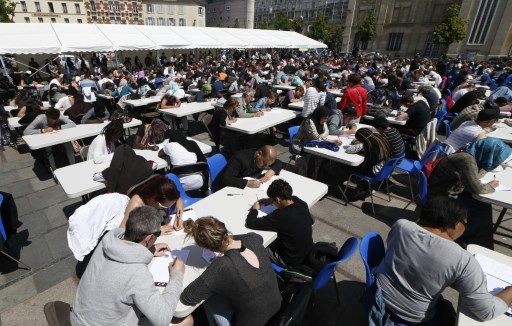White copy, pen and eraser in front of the TV. This Friday morning, dictation enthusiasts will be in front of their stations to watch the show All ready for dictation! broadcast at 10:15 a.m. on France 3, during which rapper Abd al Malik will read an extract from a work by Marcel Pagnol.
A show which demonstrates the French’s enthusiasm for spelling challenges. Apart from these television shows, hundreds of dictation competitions are organized each year in France by town halls, associations and charities. A leisure activity which has received its letters of nobility with The Golden Dicos by Bernard Pivot, a spelling championship broadcast on television between 1985 and 2005, and which Pascal Hostachy, head of the Voltaire Project, a spelling refresher organization, well remembers: “This program was hyper-familial and gave the dictated a friendly and playful character. » An opinion shared by Bruno Dewaele, crowned world spelling champion in 1992: “It was a high-level intellectual competition which left its mark. »
“It has become a board game”
If The golden dictionaries gave the “the” to these competitions, the initiatives which were born afterwards were less elitist and made it possible to reach a wider audience. “The democratization of dictations organized in the form of local competitions showed that the exercise was not reserved for the initiated. That if everyone could not solve a maths exercise, everyone could take a dictation,” explains Bruno Dewaele.
To popularize spelling competitions, their organizers have also focused on more modern texts: “The dictations offered are generally written by authors who multiply traps and puns. The texts are gripping and funny,” observes linguist Philippe Boula de Mareuil, research director at the CNRS. This made it possible to rejuvenate the participants. “If, historically, it was a sport for seniors, dictation has become unifying,” notes Pascal Hostachy. And the texts always have several levels: the beginning is adapted to juniors, the middle is more demanding, and the end is aimed at competitors.
Thematic dictations have also emerged, such as the naughty dictations which take place every month in Paris. One more asset to attract a wider audience. And if one could have believed that the painful memories that many French people keep of their dictations on the table would have put them off the exercise forever, this is not the case. “Some of them have a revenge to take and even have a touch of nostalgia by diving back into the exercise,” estimates Philippe Boula de Mareuil. And the fact of working with several people in a relaxed atmosphere helps to take the drama out of the exercise, according to Pascal Hostachy: “The score obtained by the participants being anonymous, the anxiety-provoking aspect has disappeared. Even those who make a lot of mistakes no longer hesitate to take the plunge. It has become a board game through which we have the pleasure of learning.”
“The pleasure of sharing your love of the French language”
And when they have participated once in a collective dictation, the French tend to return to it. “There is always something sparkling in their eyes. Because taking a dictation means experiencing the pleasure of sharing your love of the French language. It’s also about setting yourself an intellectual challenge,” says Bruno Dewaele. A satisfaction that Philippe Boula de Mareuil also observes: “The French like general culture games more and more. And the fact that French spelling is so complex adds prestige to dictation. »
Aside from the pleasure of the exercise, the French also understood that they had something to gain in these competitions: “Numerous studies have shown the discriminatory nature of a cover letter full of mistakes. As a result, many French people have understood that dominating the French language is a strength,” emphasizes Bruno Dewaele.
Finally, through their passion for dictation championships, the French also want to reaffirm their love for their language: “With the successive spelling reforms, the loss of vigor in writing, some have the feeling of being undermined. in danger from the French. Making a dictation is therefore a way of protecting their heritage,” says Philippe Boula de Mareuil.

